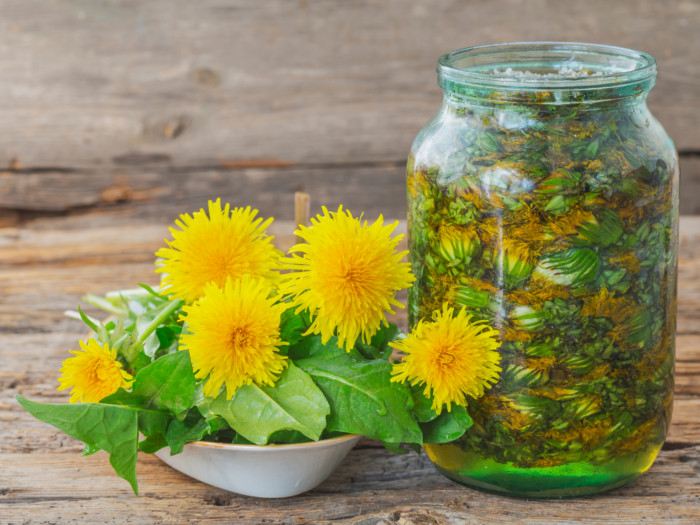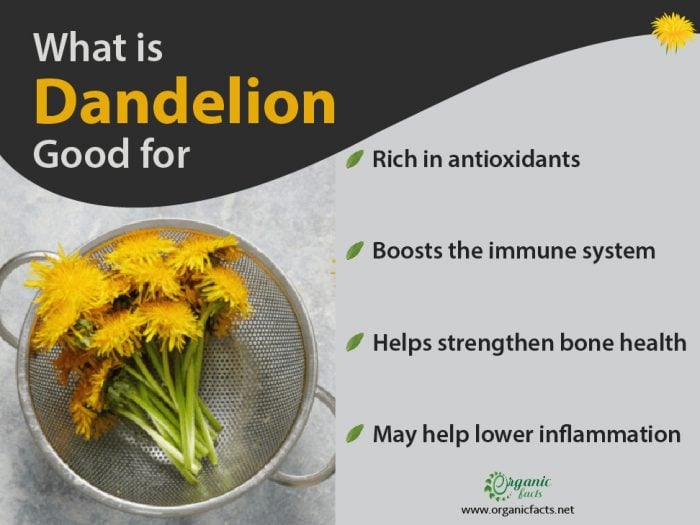Dandelion, often seen as a weed, offers significant health benefits. It helps detoxify the liver, improves digestion, and reduces inflammation. Dandelion is also known to support bone health, promote weight loss, and aid in the treatment of conditions like anemia and diabetes.
What is Dandelion (Taraxacum officinale)?
Dandelion is a flower and is a broad term for many types of flowers that are native to Europe and North America. Taraxacum is the large genus to which these plants belong. They are herbaceous and perennial plants that grow very well in temperate climates. They also reproduce quickly and effectively, so it is possible to cultivate plenty of dandelions at the same time.
Interestingly, dandelion translates into a “lion’s tooth” in French. Despite the health benefits of dandelions, they are more popular as ornamental flowering plants than as a medicine. These flowers have a yellow color and are frequently seen in gardens. In terms of history, the plant is believed to have evolved about 30 million years ago in Eurasia.

Dandelion flowers are rich in polyphenols. Photo Credit: Shutterstock
| Serving Size : | |
|---|---|
| Nutrient | Value |
| Water [g] | 85.6 |
| Energy | 45 |
| Energy [kJ] | 188 |
| Protein [g] | 2.7 |
| Total lipid (fat) [g] | 0.7 |
| Ash [g] | 1.8 |
| Carbohydrate, by difference [g] | 9.2 |
| Fiber, total dietary [g] | 3.5 |
| Sugars, total including NLEA [g] | 0.71 |
| Calcium, Ca [mg] | 187 |
| Iron, Fe [mg] | 3.1 |
| Magnesium, Mg [mg] | 36 |
| Phosphorus, P [mg] | 66 |
| Potassium, K [mg] | 397 |
| Sodium, Na [mg] | 76 |
| Zinc, Zn [mg] | 0.41 |
| Copper, Cu [mg] | 0.17 |
| Manganese, Mn [mg] | 0.34 |
| Selenium, Se [µg] | 0.5 |
| Vitamin C, total ascorbic acid [mg] | 35 |
| Thiamin [mg] | 0.19 |
| Riboflavin [mg] | 0.26 |
| Niacin [mg] | 0.81 |
| Pantothenic acid [mg] | 0.08 |
| Vitamin B-6 [mg] | 0.25 |
| Folate, total [µg] | 27 |
| Folate, food [µg] | 27 |
| Folate, DFE [µg] | 27 |
| Choline, total [mg] | 35.3 |
| Vitamin A, RAE [µg] | 508 |
| Carotene, beta [µg] | 5854 |
| Carotene, alpha [µg] | 363 |
| Cryptoxanthin, beta [µg] | 121 |
| Vitamin A, IU [IU] | 10161 |
| Lutein + zeaxanthin [µg] | 13610 |
| Vitamin E (alpha-tocopherol) [mg] | 3.44 |
| Vitamin K (phylloquinone) [µg] | 778.4 |
| Fatty acids, total saturated [g] | 0.17 |
| 14:0 [g] | 0.01 |
| 16:0 [g] | 0.15 |
| 18:0 [g] | 0.01 |
| Fatty acids, total monounsaturated [g] | 0.01 |
| 18:1 [g] | 0.01 |
| Fatty acids, total polyunsaturated [g] | 0.31 |
| 18:2 [g] | 0.26 |
| 18:3 [g] | 0.04 |
| Sources include : USDA [1] | |
Dandelion Nutrition Facts
According to the USDA Food Data Central, one cup of chopped dandelion greens are mostly made up of water and low in calories. They also contain carbohydrates and fiber. Other nutrients may include vitamins A, B6, C, and K as well as minerals, iron, calcium, magnesium, potassium, and sodium. [2]
Health Benefits of Dandelion
Let us understand the different health benefits of dandelions below.
May Promote a Healthy Liver
A study published in the Korea Food Research Institute has found that dandelion leaf extract may provide relief from non-alcoholic fatty liver disease. [3]
Some people also believe that antioxidants like vitamin C and luteolin, in dandelions, may keep the liver functioning in optimal gear. These nutrients might be able to protect it from toxins and may help treat hemorrhaging in the liver.
May Aid Digestion
A study published in 2017 states that inulin, a carbohydrate, can be very helpful in maintaining a healthy gut. It turns out that dandelions contain a good amount of inulin, so adding it to your diet can contribute to improved bacterial flora in the intestinal tract. [4]
Dandelion supplements may aid in maintaining the proper flow of bile, while can also stimulate the liver and promote digestion. Being rich in fiber, dandelions might also aid in lowering the risk of dyspepsia, diverticulosis, and irritable bowel syndrome (IBS). Dandelion is commonly prescribed for children who are experiencing constipation, as it can be relatively soothing on the stomach.
May Help Manage Diabetes
A research study published in The Review of Diabetic Studies revealed that dandelion exhibits promising anti-diabetic properties. Dandelion juice may aid people with diabetes by stimulating the production of insulin from the pancreas, thereby regulating the blood sugar level. Regulated blood sugar and maintained insulin level may help prevent dangerous spikes and plunges in people with diabetes. [5] [6]
May Act As A Potential Skin Care Agent
Dandelion sap, also known as dandelion milk, may be useful in treating skin diseases, which are caused by microbial and fungal infections. This treatment stems from the fact that the sap is highly alkaline and has germicidal, insecticidal, and fungicidal properties. [7]
In a 2015 study, dandelion extracts show potential in protecting your skin from UV damage. The research says that excess exposure to UV irradiation may cause premature aging of the skin and dandelion leaf and flower extracts can shield you from that. [8]
Furthermore, dandelion extracts have anti-inflammatory properties, which may help curb acne. It also helps in moisturizing your skin. [9]
May Aid Weight Loss
Studies on herbal remedies for weight loss show that dandelion may be helpful. One research suggests that bitter herbs like dandelion, when taken in the form of tea or infusions, may help in the breakdown of fat. While many people include dandelion in their diet for weight management, an ample amount of research is still awaited to gauge its effect on obesity. [10]
May Boost Immunity
Dandelion may have been traditionally used to relieve symptoms of hepatitis and according to a research, the dandelion supplements may aid in treating hepatitis. Another study suggests that dandelion may help protect the immune system against various diseases with the potential for developing therapies for certain diseases with reduced side effects. It has antimicrobial properties and may aid in preventing bacterial infections. A 2018 study suggests dandelions have antibacterial properties that fight Staphylococcus aureus bacteria. [11] [12] [13] [14]
May Alleviate Anemia
Dandelions may have good levels of iron, vitamins, and protein. While iron is an integral part of hemoglobin in the blood, vitamin B and protein are essential for the formation of red blood cells (RBCs) and certain other components of the blood. [15]
May Regulate Blood Pressure
Dandelions, being diuretic in nature, may increase urination, both in quantity and frequency. Traditional medicine believes that this can help in detoxifying your body. Anecdotal evidence also suggests that it may help in riding your body of excess fluids, thereby lowering blood pressure. [16]
Dandelion may even be a good source of potassium. This mineral has been connected to lower blood pressure in people who have hypertension and are not taking any medicines. [17]

Dandelion is a flower and is a broad term for many types of flowers that are native to Europe and North America.
May Help In Prenatal Care
Vitamin A, calcium, and iron, found in dandelions, are great nutrients for any mom-to-be. The American Pregnancy Association suggests that it may help relieve mild edema and nourish the liver. It might also aid in the third trimester as it can protect pregnant women from night blindness. [18]
May Improve Bone Health
The benefits of dandelion roots may also include healthy bones. Research suggests that inulin (a type of soluble fiber) found in the dandelion root may help prevent osteoporosis. [19]
Including Dandelions in Your Diet
There are many ways to include dandelion in your diet as it is available in many forms. Here are the recommended dosages of this plant and its supplements. [20]
- Fresh leaves: 4-10 g daily
- Dried leaves: 4-10 g daily
- Leaf tincture: 2-5 ml, three times a day
- Fresh leaf juice: 1 teaspoon twice daily
- Fluid extract: 1-2 teaspoon daily
- Fresh roots: 2-8 g daily
- Dried powder extract: 250-1000 mg four times a day
You can use dandelions in your daily diet in the following ways.
- You can make your own dandelion wine, fry up the flowers into fritters, make coffee out of the stem, leaves, and seeds, and so much more.
- Our recipe on dandelion root tea and dandelion leaf tea are great options if you are looking for a new addition to your breakfast.
- If you have dandelion flowers on hand, you can also make a chilled cup of dandelion flower tea.
- You can use dandelion greens in your salads and sandwiches.
- Dandelion greens can be used to make a refreshing pesto.
Side Effects of Dandelions
There are a couple of side effects when you include dandelions in your diet. They are:
- Dandelions may help lower blood sugar, but for people already taking blood-sugar modulators, this can result in hypoglycemia, an equally dangerous condition. [21]
- If you are allergic to plants like ragweed, chrysanthemums, marigolds, and daisies, you may experience the same with dandelions. The milky sap of dandelions has been known to cause itchiness, irritation, or allergic reactions on the skin, and should be kept away from the eyes. [22]
- There is a rare type of fiber in dandelions called inulin and some people have a predisposed sensitivity or allergy to it which can be quite severe. [23]
Note: It is advised that pregnant and breastfeeding women should exercise caution before consuming any herbal tea in any form as it may lead to adverse effects.
Consult your doctor before adding dandelion or its supplements in addition to your normal treatment.
While adding dandelions to your diet in any way, start small and closely monitor your body’s response. Other than that, pick some delicious dandelion greens and get healthy!
